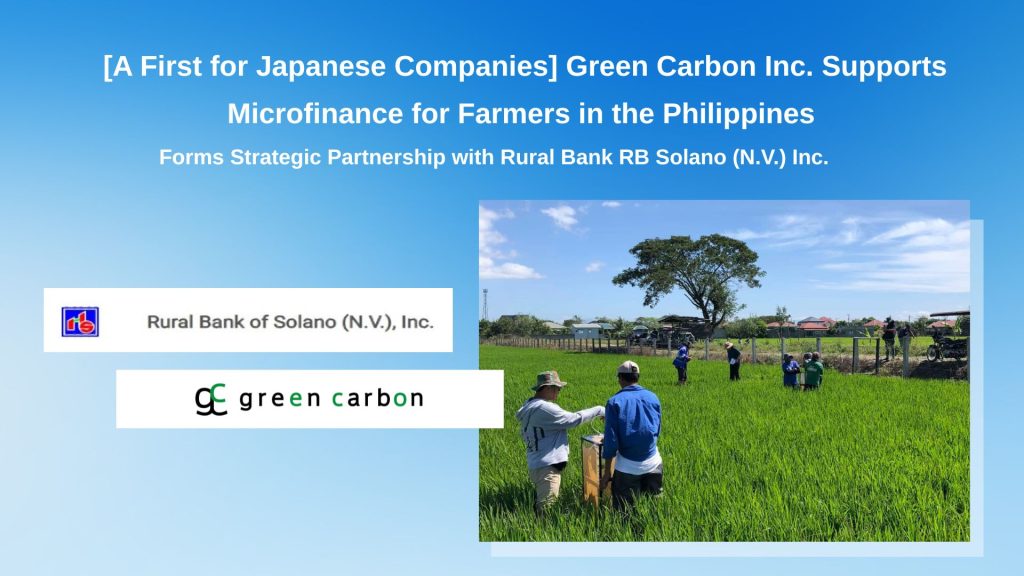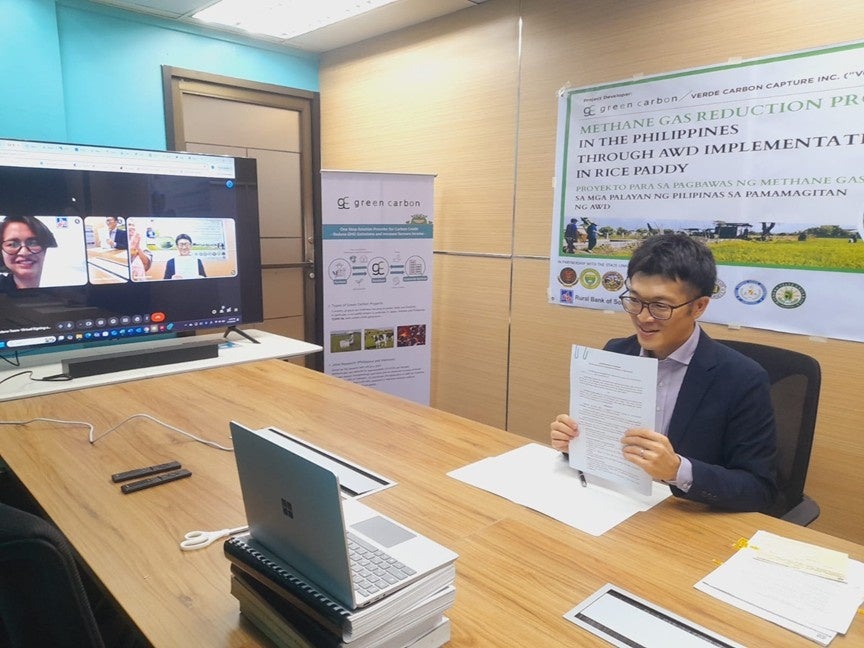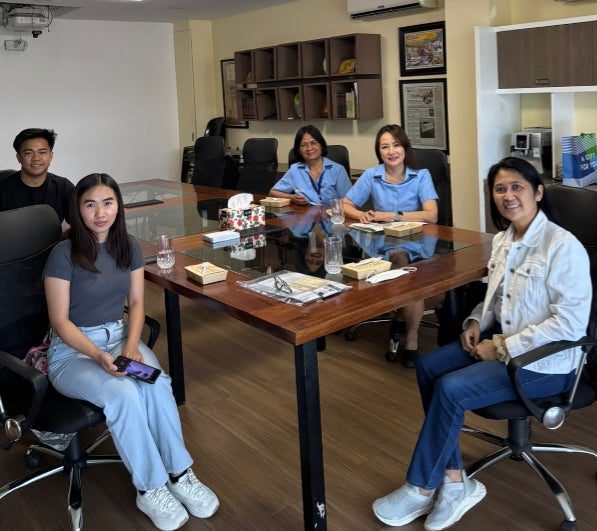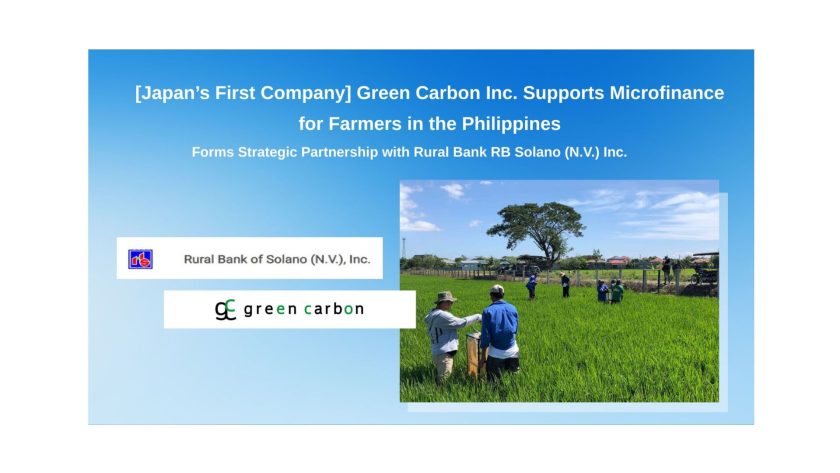To Revitalize Agriculture in the Philippines, Green Carbon Launches Program to Promote Microfinance and Financial Literacy for Farmers.
Green Carbon Inc. (CEO: Jun Ohkita, hereinafter “Green Carbon”), a company engaged in the creation and sale of nature-based carbon credits, and its subsidiary Verde Carbon Capture Inc. (CEO: Masato Senoo, hereinafter “VCCI”), are pleased to announce the signing of a strategic partnership (hereinafter “the Partnership”) with the Rural Bank of Solano (N.V.) Inc. (CEO: Mary Ann E.M. Tupasi-Saddul, hereinafter “ARB Solano”), a rural development bank located in Northern Luzon, Philippines.
Through this partnership, Green Carbon and VCCI will support microfinance*1 for farmers in the provinces of Nueva Vizcaya and Isabela in the Philippines. The program aims to improve farmers’ access to financial services and promote financial literacy.

◯For inquiries regarding this release and for more details, please contact us here.
◯Click here to download the Green Carbon Corporation company profile.
◆Background of the Partnership
Green Carbon has been engaged in the creation of nature-based carbon credits, particularly across Southeast Asia, and is developing projects in a wide range of fields such as forest conservation, rice paddies, mangrove reforestation, reduction of methane emissions from cattle, and biochar initiatives. The company designs projects that align with the characteristics of each region’s natural resources and ensures efficient and transparent operations through the use of satellite data for site selection and monitoring.
Among these efforts, the Philippines has been one of Green Carbon’s major focus areas. The country’s agricultural sector emits approximately 54 million tons of greenhouse gases (GHG)*2 annually, with about 13 million tons—roughly 25% of agricultural emissions*3—coming from rice paddies. Therefore, reducing emissions from this sector is an urgent task. In response, Green Carbon began developing a methane reduction project for rice paddies using AWD (Alternate Wetting and Drying)*4 in FY2023, in collaboration with local research institutions.
Despite the agricultural sector accounting for about 25% of the total labor force in the Philippines, its contribution to GDP remains at just 9.4%*5. This highlights the challenges of low productivity and income in the sector. Only around 55% of Filipinos have a bank account*6, and among them, 45% cite “lack of funds” as the reason for not having one, with a significant portion being farmers*7. As a result, small-scale farmers and those without sufficient collateral face difficulties in obtaining loans, preventing them from making necessary initial investments in fertilizers or farming equipment to improve efficiency. Furthermore, there are insufficient financial resources to support farmers who wish to access loans, indicating a lack of a well-developed agricultural finance system.
In response to these challenges, Green Carbon entered into this strategic partnership with RB Solano to support microfinance for farmers in the provinces of Nueva Vizcaya and Isabela in the Philippines. This initiative marks a significant step forward in expanding inclusive financial opportunities within farming communities.

◆Support for Local Farmers
Through this partnership, we aim to provide the following support to farmers participating in the AWD (Alternate Wetting and Drying) project in Nueva Vizcaya and Isabela provinces.
| Microfinance support tailored to agricultural needs |
| Simplified procedures for opening bank accounts |
| Financial literacy training programs |
| Quick and efficient funding |
| Financial services to support sustainable and productive farming (e.g., crop insurance) |
With the implementation of AWD, an increase in rice yield is expected for farmers. The resulting income growth will enhance their creditworthiness over time. This is anticipated to lead to a long-term and positive relationship between RB Solano and the farmers.


◆Future Outlook
By combining Green Carbon’s efforts toward sustainable agriculture and RB Solano (N.V.) Inc.’s expertise in banking, the partnership will not only bring benefits such as increased yield and farmer compensation through the AWD project, but will also enable access to financial services for farmers who previously had limited access to traditional banking. Through these services, we aim to create a foundation that supports not only financial access, but also the acquisition of knowledge and opportunities essential for farmers’ growth and development.
Green Carbon will continue to expand its AWD initiatives and broaden partnerships with community-based businesses, striving to improve both agriculture and the livelihoods of local farmers.
1: Microfinance
Microfinance is a system that provides small-scale loans, insurance, and other financial services to people who have difficulty accessing traditional bank loans—such as the poor and low-income earners—in order to support their self-reliance and escape from poverty.
2: Annual GHG emissions from agriculture in the Philippines: Approx. 54 million tons
Source: Department of Environment and Natural Resources, Philippines (2023)
https://niccdies.climate.gov.ph/files/documents/The%20Philippines-%20NDC%20Implementation%20Plan%20-%20072024.pdf
3: GHG emissions from rice paddies in the Philippines: Approx. 13 million tons
Source: Journal of Food, Agriculture and Environment (2016)
https://www.researchgate.net/publication/273636139_Greenhouse_gas_emissions_from_rice_production_in_the_Philippines_based_on_life-cycle_inventory_analysis
4: Alternate Wetting and Drying (AWD)
AWD is a technique in which irrigation and natural drying are alternated every few days based on the water level in the paddy field. Compared to continuous irrigation, AWD reduces water usage and helps conserve water resources.
5: The agriculture, forestry, and fisheries sector accounted for 9.4% of the Philippines’ GDP in 2023.
https://data.worldbank.org/indicator/NV.AGR.TOTL.ZS?locations=PH&name_desc=false
6: 2021 Final Inclusion Survey
https://www.bsp.gov.ph/Inclusive%20Finance/Financial%20Inclusion%20Reports%20and%20Publications/2021/2021FISToplineReport.pdf
7: 2023 Article – “Bridging the divide: Improving financial inclusion in rural Philippines”
https://blog.advance.ai/blog/bridging-the-divide-improving-financial-inclusion-in-rural-philippines
◆ Green Carbon, Inc.
Representative :Jun Okita, CEO
Location :2-3-2 Kojimachi, Chiyoda-ku, Tokyo, Hanzomon PREX North 9F WeWork
Establishment :December 2019
Business :Carbon credit creation and sales business, agriculture-related business, environment-related business, other related businesses and ESG consulting business
URL : https://green-carbon.co.jp/
◆About Green Carbon, Inc. Business
Green Carbon operates with the vision of “Saving the Earth with the Power of Life,” providing comprehensive support from carbon credit creation, registration, to sales. Additionally, we are involved in agriculture-related businesses, research and development, ESG consulting, among others. Our main focus is on generation carbon credits through methane gas reduction in rice paddies, where we have obtained certification for J-Credits, the first and largest in Japan (approximately 6,220 tons), and plan to expand to around 50,000 hectares in the fiscal year 2024. We also offer a service called “Agreen” that integrates credit registration, application, and sales into one platform, simplifying procedures such as application registration and document preparation, thus reducing the workload for credit creators.

